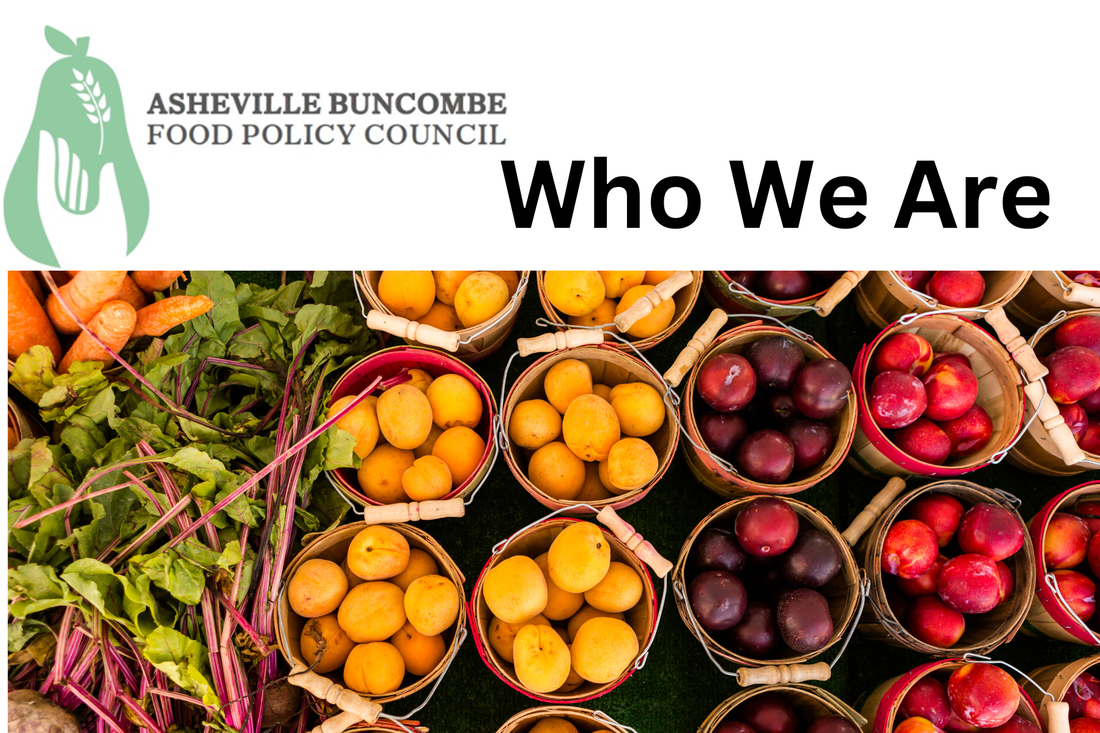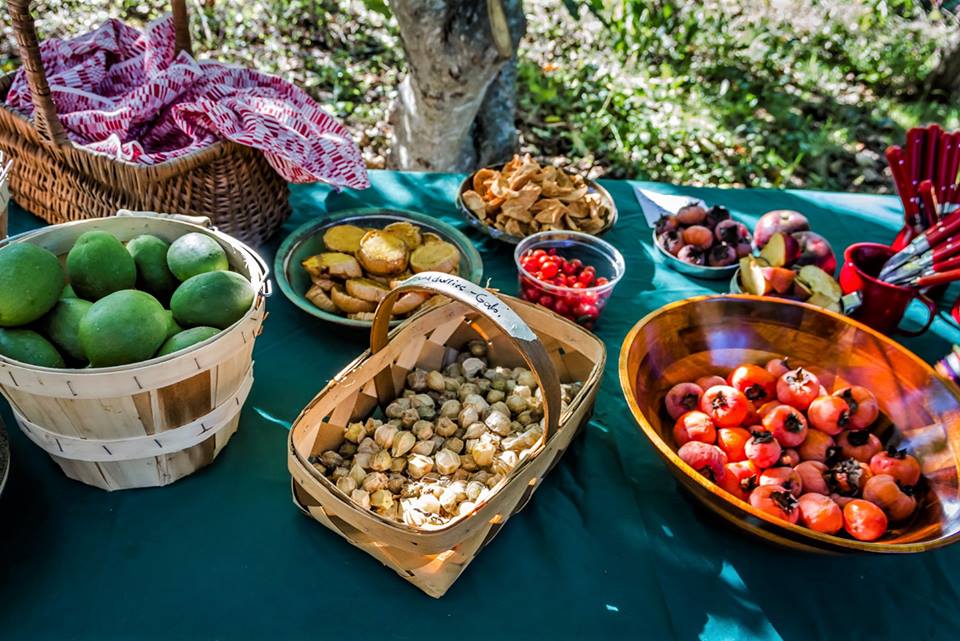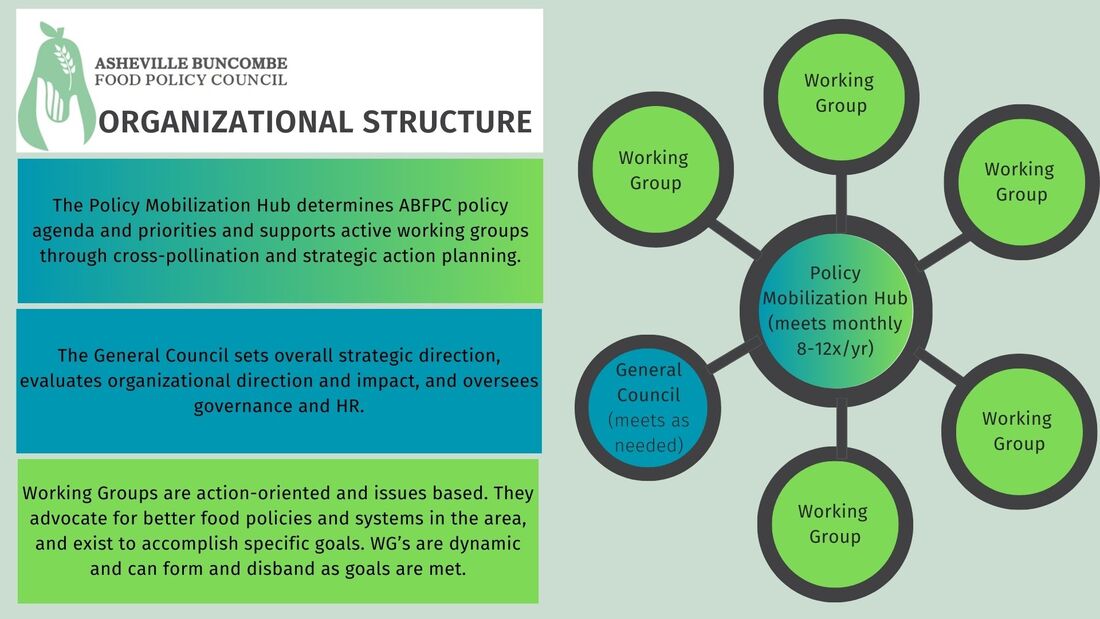The Asheville-Buncombe Food Policy Council (ABFPC) is a community-based coalition in Buncombe County, North Carolina committed to policy improvements that create healthier food environments and improve healthy food access for all Buncombe County residents.
We work in specialized Working Groups bringing issues to our Policy Mobilization Hub for action influencing policy, advocacy and systems change. Our General Council is the governing body of the organization taking on administration, overall strategic planning, human resources and structural guidance.
Whether viewed through the lens of poverty, public health, local commerce, or sustainability, access to affordable, healthy, locally sourced food is crucial to our region’s success.
We work in specialized Working Groups bringing issues to our Policy Mobilization Hub for action influencing policy, advocacy and systems change. Our General Council is the governing body of the organization taking on administration, overall strategic planning, human resources and structural guidance.
Whether viewed through the lens of poverty, public health, local commerce, or sustainability, access to affordable, healthy, locally sourced food is crucial to our region’s success.
What IS a Food Policy Council?
Food Policy Councils (FPCs) provide a forum for food advocates from across the community to come together and address common concerns regarding food policy.
Broadly defined, food policy is a set of collective decisions made by governments at all levels, businesses, and organizations that affect how food gets from the farm to your table.
A food policy can be as broad as a federal regulation on food labeling or as local and specific as a zoning law that lets city dwellers raise honeybees…a vast food system generates many policies, and for the most part, the average citizen doesn’t have much of a role in shaping them.
Food Policy Councils provide a pathway to address this lack of participation by bringing together all stakeholders in a community food system and organizing a voice to construct systems that reflect our shared values.
To learn more about Food Policy Councils, check out “Doing Food Policy Councils Right: a Guide to Development and Action”
Broadly defined, food policy is a set of collective decisions made by governments at all levels, businesses, and organizations that affect how food gets from the farm to your table.
A food policy can be as broad as a federal regulation on food labeling or as local and specific as a zoning law that lets city dwellers raise honeybees…a vast food system generates many policies, and for the most part, the average citizen doesn’t have much of a role in shaping them.
Food Policy Councils provide a pathway to address this lack of participation by bringing together all stakeholders in a community food system and organizing a voice to construct systems that reflect our shared values.
To learn more about Food Policy Councils, check out “Doing Food Policy Councils Right: a Guide to Development and Action”
Click above to check out our New Member Orientation!
interested in getting involved?
Find a Working Group that interests you by attending a Policy Mobilization Hub meeting!
Email [email protected] to find out about other ways to get involved.
Email [email protected] to find out about other ways to get involved.
mission and vision
Our mission is to identify, propose and advocate for policies, financial appropriations, and innovative solutions to improve and protect our local food system in order to advance economic development, social justice, environmental sustainability, and community resiliency.
Our vision is that all residents of Buncombe County have access to and the option to cultivate and prepare nutritious food within a resilient and sovereign foodshed that sustainably harvests and conserves farmland, forests, and water resources, sustains our population, collaborates with neighboring counties, and ensures a thriving agriculture-related economy.
Our vision is that all residents of Buncombe County have access to and the option to cultivate and prepare nutritious food within a resilient and sovereign foodshed that sustainably harvests and conserves farmland, forests, and water resources, sustains our population, collaborates with neighboring counties, and ensures a thriving agriculture-related economy.
HISTORY AND BACKGROUND
|
Asheville and Buncombe County are often included in national “best of” lists. The growing local food movement and burgeoning, innovative dining and beer scene in the region has even led Asheville to be branded as “Foodtopia” by many.
However, this region also has the unwelcome distinction of making it onto the “top ten” list of most food insecure communities in the nation. In, a 2013 report by the Food Research and Action Center ranks the Asheville Metropolitan Statistical Area as the ninth hungriest city in the nation, with more than 1 in 5 (21.8%) of residents experiencing “food hardship.” That same report ranked North Carolina as the tenth hungriest state in the nation.
|
- At that time, a survey by Tyson Foods, Inc. listed North Carolina as the second most food insecure state in the nation, and another survey named Asheville as the nation’s 6th most food insecure metropolitan area.
- Learn more about the data behind food insecurity in the region in the ABFPC Food Insecurity White Paper (August 2011).
- The founding members of the ABFPC recognized a need for a local, community-driven entity to address food security, food justice, and food systems sustainability and access issues in Asheville and Buncombe County.
- Learn more about how the ABFPC was started in our Year One Snapshot Report (2012).
YEAR ONE SNAPSHOT REPORT
Asheville-Buncombe Food Policy Council Year One Snapshot
At the end of 2012, the Asheville-Buncombe Food Policy Council (AB FPC, or Council) turned one year old. Since its first meeting in October 2011, the AB FPC has generated a lot of momentum and discussion around food security and food policy issues in the Asheville/Buncombe County area of North Carolina. One year in, this report takes a look at where the Council has been, what is happening now, and where it wants to go over the next few years. It also examines what about how the Council is operating is working well and what could be working better to help the Council achieve its goals even more effectively.
This report compiles information gathered from a variety of sources including: key informant interviews with members of the founding core group for the AB FPC; surveys of cluster representatives; and surveys of General Council members.
Group to ask Asheville council for food-policy commitments | Carolina Public Press on January 18, 2013 at 1:16 pm
Asheville-Buncombe Food Policy Council Year One Snapshot
At the end of 2012, the Asheville-Buncombe Food Policy Council (AB FPC, or Council) turned one year old. Since its first meeting in October 2011, the AB FPC has generated a lot of momentum and discussion around food security and food policy issues in the Asheville/Buncombe County area of North Carolina. One year in, this report takes a look at where the Council has been, what is happening now, and where it wants to go over the next few years. It also examines what about how the Council is operating is working well and what could be working better to help the Council achieve its goals even more effectively.
This report compiles information gathered from a variety of sources including: key informant interviews with members of the founding core group for the AB FPC; surveys of cluster representatives; and surveys of General Council members.
Group to ask Asheville council for food-policy commitments | Carolina Public Press on January 18, 2013 at 1:16 pm
GET TO KNOW US
The ABPFC currently operates on a volunteer basis with one part-time coordinator staff position. We are passionate non-profit leaders, community organizers, farmers, nurses, life coaches, parents, and concerned citizens alike. No matter what our various roles are in the community, we all come together around our common passion for reducing food insecurity.
Staff
|
In early 2024, Liz Avery joined the Asheville Buncombe Food Policy Council as a part-time coordinator! Having completed a Bachelor of Science in Multidisciplinary Anthropology and Sustainable Development from Appalachian State University, Liz spent their postgraduate years working with farms supported by Blue Ridge Women in Agriculture in Watauga County. They moved to the Asheville area and started volunteering with ABFPC in June 2023. Liz is dedicated to advocacy with a particular focus on food sovereignty, social justice, community resilience, and waste reduction.
Contact Liz at [email protected]. |
LEADERSHIP STRUCTURE
The Leadership Structure of the Asheville Buncombe Food Policy (ABFPC) consists of three main groups; the General Council, the Policy Mobilization Hub, and the Affiliate Group.
General Council
The General Council sets the overall strategic direction of the ABFPC, facilitates communication between working groups, evaluates organizational direction and impact, and oversees governance and Human Resources.
General Council members have been actively engaged in ABFPC working groups and/or Policy Mobilization Hub for at least one year and commit to at minimum term of one year as a General Council member.
General Council meetings employ consent-based decision making facilitation deriving from Circle Forward methods. Facilitation is rotating and meeting minutes are available upon request
General Council members have been actively engaged in ABFPC working groups and/or Policy Mobilization Hub for at least one year and commit to at minimum term of one year as a General Council member.
General Council meetings employ consent-based decision making facilitation deriving from Circle Forward methods. Facilitation is rotating and meeting minutes are available upon request
Policy Mobilization Hub
The Policy Mobilization Hub will cross-pollinate between active Working Groups, determine the ABFPC policy agenda and priorities, and support Working Groups with strategic action planning. The Policy Mobilization Hub will meet 8 times a year and attendance at one of these meetings is the first step to starting a new Working Group for folks who are interested in getting the ABFPC’s support with new initiatives.
As with General Council meetings, PMH meetings employ consent-based decision making facilitation deriving from Circle Forward methods. Facilitation is rotating and meeting minutes are available upon request.
As with General Council meetings, PMH meetings employ consent-based decision making facilitation deriving from Circle Forward methods. Facilitation is rotating and meeting minutes are available upon request.
WORKING GROUPS
Working Groups: the driving force behind the Food Policy Council
|
Our members organize around key issues to advocate for better food policies and systems in the Asheville-Buncombe area. These Working Groups operate independently, coming together through the Policy Mobilization Hub, directed by General Council to strategize, organize, and mobilize policy and advocacy in support of ABFPC’s mission.
Read more about specific items being addressed by Working Groups below. If you’re interested in creating a working group not covered by the topics described below, start by watching the short video posted to the right then email [email protected] for the next steps outlined in the video. We can’t wait for you to join us! |
|
EMERGENCY FOOD PREPAREDNESS
COMMUNICATIONS MATERIALS AND STRATEGY
|
Emergent Issues & New Working Group Proposals
Community members are always invited to bring issues and ideas for new working groups to ABFPC. If you have an idea for a working group please attend a Policy Mobilization Hub meeting or reach out to the ABFPC coordinator – [email protected].
To establish a working group:
To establish a working group:
- Attend a Policy Mobilization Hub Meeting to connect with active folks and discuss your ideas
- Recruit folks interested in this area to form a working group
- Connect with ABFPC coordinator to complete the Working Group Checklist (that’s a PDF version — when you’re ready, email the coordinator and we’ll provide an online version for you to complete)
- Rally your team to make positive change
- Questions?










